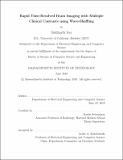Rapid time-resolved brain imaging with multiple clinical contrasts using wave-shuffling
Author(s)
Iyer, Siddharth(Siddharth Srinivasan)
Download1124925088-MIT.pdf (18.91Mb)
Other Contributors
Massachusetts Institute of Technology. Department of Electrical Engineering and Computer Science.
Advisor
Kawin Setsompop.
Terms of use
Metadata
Show full item recordAbstract
Magnetic Resonance Imaging (MRI) is a non-invasive but slow biomedical imaging modality that produces images of multiple desirable contrasts. Currently, multiple receive channels are used in MRI to exploit redundancy and sample fewer data points for faster acquisition. Wave-CAIPI is a recently introduced technique that modifies the acquisition scheme in a manner that improves the effectiveness of the receive channels, allowing for higher rates of acceleration. In this work, the principle behind Wave-CAIPI is applied to a compressed-sensing technique called Shuffling. In Shuffling, the spatial and temporal axis are randomly sampled and the data is reconstructed with temporal subspace constraints, yielding a time-series of images with desirable contrast. Combining Wave-CAIPI and Shuffling achieves rapid, time-resolved imaging of brain at 1mm-isotropic spatial resolution in clinically feasible times.
Description
This electronic version was submitted by the student author. The certified thesis is available in the Institute Archives and Special Collections. Thesis: S.M., Massachusetts Institute of Technology, Department of Electrical Engineering and Computer Science, 2019 Cataloged from student-submitted PDF version of thesis. Includes bibliographical references (pages 41-42).
Date issued
2019Department
Massachusetts Institute of Technology. Department of Electrical Engineering and Computer SciencePublisher
Massachusetts Institute of Technology
Keywords
Electrical Engineering and Computer Science.